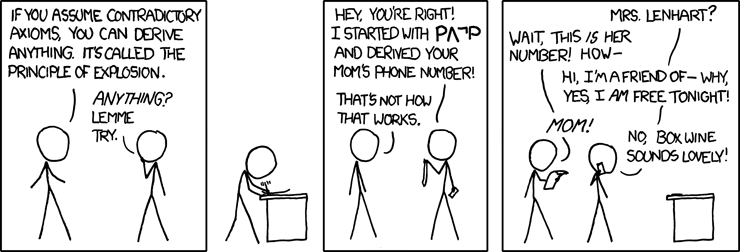
There is a famous story about Bertrand Russell, who proved that if 1=0, he was the Pope. Add 1 to each side of the equation. This gives you the equation 2=1. The set containing Russell and the Pope has two members. But since 2=1 it has one member. And since it is the set of Rusell and the Pope that single member must be both Bertrand Russell and the Pope. Therefore Bertrand Russell is the Pope.
There are, however, many reasons why one wouldn't want a logical system in which contradictions imply everything whatsoever; for instance, one could want a logical system in which contradictions imply nothing whatsoever. Systems in which contradictions don't explode, that is, in which they don't imply everything, are called paraconsistent systems. The usual way of making a paraconsistent system in philosophical circles is to deny disjunctive syllogism; anyone who has been reading me long enough knows that I find this an exasperatingly silly move. Disjunctive syllogism is a central inference rule; eliminating it to avoid explosion is like welding shut the vault to keep the bank from being robbed. A far more rational strategy, which is more popular in computer science circles than it is in philosophy circles, is to eliminate the rules of addition and weakening; this makes sense because they are the only rules that let you introduce absolutely anything into an inference in the first place. If you take that route, you can avoid explosion and still reason like an intelligent person.
But to some extent it is a matter of notational convenience rather than serious substance; as Hartley Slater has noted, whenever you start messing with any inference rules you are also changing the kind of operations you are doing: 'or' simply does not mean the same thing, does not indicate the same connection or operation, in a system that has disjunctive syllogism when compared to a system that does not have disjunctive syllogism. But that's an argument for a paraconsistent system that keeps disjunctive syllogism, too, because we should keep the things that are most useful.